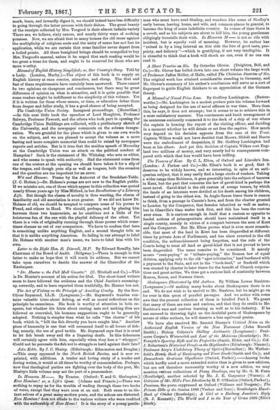The Tenures of Kent. By C. L. Elton, of Oxford
and Lincoln's Inn. (London: J. Parker and Co.)—Mr. Elton's book is so good, that it deserves to be widely known, and so interesting, in spite of an anti- quarian subject, that it may easily find a largo circle of readers. Taking a wider range than Robinson, it goes generally into the subject of tenures in Kent, but the part that concerns the law of gavel-kind is perhaps the most novel. Gavel-kind is the old custom of socage tenure, by which the lands of an intestate were divided at his death among his children, instead of going to the eldest ion. In Anglo-Saxon times there is reason to think, from a passage in Canute's laws, and from the charter granted to London by the Conqueror, that females inherited as well as males ; but in Glanville's time males took first, and this has been the custom ever since. It is curious enough in itself that a custom so opposite to feudal notions of primogeniture should have maintained itself in a single county, merely in 'virtue of a compact between the men of Kent and the Conqueror. But Mr. Elton proves what is even more remark- able, that most of the land in Kent has been disgavelled at different times by private Acts of Parliament, and has since reverted to the old condition, the enfranchisement being forgotten, and the rule of the Courts being to treat all land as gavel-kind that is not proved to have been disgavelled. The name remains to be considered. It merely means "rent-paying" or "tribute-paying," the Roman law of equal division, applying only to tho old "ager tributarius," land burdened with a payment to the State, and not to the "book-land," or freehold which was created by charter in later times for the benefit of Church corpora- tions and groat nobles. We thus get a curious link of continuity between Roman, Saxon, and Norman times.






























 Previous page
Previous page